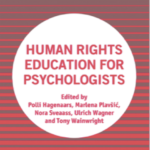
Human Rights Education
for Psychologists
Introduction
The editors of this book are all members of the GNPHR. The book is designed to raise awareness of the implications of human rights for psychology, and provide knowledge and tools enabling psychologists to put a human rights perspective into practice. In addition, it has material about the application of psychological science and practice to circumstances where human rights issues are in play.
Below are the chapter headings and there is further information, including a student resource pack available on the publisher’s website.
Psychologists have always been deeply engaged in alleviating the harmful consequences human rights violations have on individuals. However, despite the fundamental role that human rights play for professional psychology and psychologists in many areas of their practice, human rights education is underdeveloped in psychologists’ academic and vocational training. This book aims to address this by:
- raising awareness among professional psychologists, university teachers and psychology students about their role as human rights promoters and protectors
- providing knowledge and tools enabling them to put a human rights perspective into practice
- providing texts and methods for teaching human rights.
The chapters span 18 countries and six continents and identify how psychologists can ensure they are practicing in a responsible way, as well as contributing to wider societal concerns and policy development.
The book also Includes hands-on recommendations, case studies and discussion points, that will be useful for professional psychologists as part of continuing professional development and those in training and taking psychology courses.
It is also important to stress that efforts at human rights promotion and prevention of human rights violation involves everyone and so the application of psychological ideas can be helpful whatever role you have including citizen, policy maker, other professional groups.
The editors acknowledge the inspiration they drew from Professor Robert Roe, past president of the European Federation of Psychologists’ Associations, and to whom the book is dedicated. Robert passed away in February 2016.
Foreword: Psychology for human rights: Human Rights Education
for Psychologists
By Saths Cooper
Preface by the editors: Human rights are for all
PART I A human rights based-and-oriented psychology
Chapter 1 The Universal Declaration of Human Rights: foundations for a human rights based-and-oriented psychology
By Polli Hagenaars and Ava Thompson
Chapter 2 Human rights – How do they matter for the profession of psychology?
By Nora Sveaass and Michael Wessells
Chapter 3 Main human rights instruments and bodies, relevant for psychologists’ interventions
By Manfred Nowak and Anna Zenz,
Chapter 4 Human rights: cross-national and cross-cultural perspectives
By Rama Charan Tripathi
Chapter 5 Critical human rights-based approach to applied psychology: context and power
By Nimisha Patel
PART II Psychology and social accountability
Chapter 6 Human rights and professional identity
By George Ulrich and Tony Wainwright
Chapter 7 Use and misuse of psychological science, knowledge and research
By Tony Wainwright and Giovanna Leone
Chapter 8 Playing together: children’s human rights and psychology
By Kerstin Söderström and Ragnhild Dybdahl
Chapter 9 Human rights in business and employment: promoting the right to decent work
By Kathleen Otto, Martin Mabunda Baluku, Ulrike Fasbender
Chapter 10 Social accountability and action orientation: strengthening the policy-making capacity of psychologists
By Elizabeth Lira
PART III Human rights and professional practice
Chapter 11 Universal human rights – except for some
By Paul D’alton
Chapter 12 The Convention on the Rights of Persons with Disabilities and the challenge to treatment without consent of individuals with psychosocial disabilities
By Bernadette McSherry and Lisa Waddington
Chapter 13 Forced migration–psychological contributions that might help to improve the human rights situation
By Ulrich Wagner
Chapter 14 Indigenous groups facing environmental racism: human rights, resilience and resistance in Palestinian communities of the West Bank and the Mapuche of Chile
By Devin G. Atallah and Michael Ungar
Chapter 15 Torture and the role of the psychological profession
By Pau Pérez-Sales and Nora Sveaass
Chapter 16 Gender and war: Bosnian psychologists dealing with con!ict-related sexual violence during and after war
By Inger Skjelsbæk
PART IV Human rights educational practice for psychologists
Chapter 17 Core competences for psychologists practising human rights-based approaches
By Marlena Plavšić, Tony Wainwright and Artemis Giotsa
Chapter 18 Planning human rights education for psychologists
By Felisa Tibbitts and Polli Hagenaars
Chapter 19 Stories of human rights–teaching and learning
By Sarah Butchard, Tommy Dunne, Hilda Engel and Artemis Giotsa
Postscript Janel Gautier
